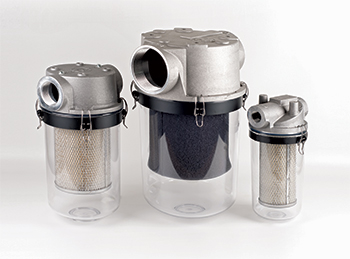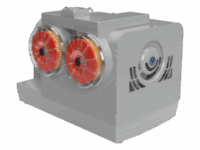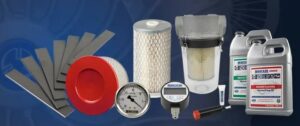Your vacuum pump is built for reliable performance, but proper maintenance is key to keeping it running efficiently. One often overlooked component is the pump’s filters.
Oil and air filters trap contaminants like dust, debris, and oil mist, preventing damage. Over time, clogged filters can reduce efficiency, cause overheating, and even lead to costly breakdowns.
Below, we’ll cover key signs that indicate a vacuum pump filter change is needed, factors affecting replacement frequency, and why regular maintenance is essential for maximizing pump performance and lifespan.
WHEN SHOULD YOU REPLACE YOUR VACUUM PUMP FILTER?
Regular filter maintenance is a simple yet essential step to protect your pump, maintain efficiency, and extend equipment lifespan.
Vacuum pumps may have up to three types of filters, depending on the model and application:
- Air filters: Capture dust and debris from incoming air. They can be installed on the pump or in line with your vacuum system.
- Oil filters: Remove contaminants like dust and rust from oil-filled pump units.
- Separator elements: Filter oil mist from the exhaust of oil-filled pumps. If they fail or become clogged/saturated, oil mist may escape from the unit. In some dry vane pump models, there is a separating element to separate carbon dust from the vanes from the exhaust air.
Air filters and separators are typically reusable with proper cleaning, while clogged air & oil filters require replacement.
6 SIGNS IT’S TIME TO REPLACE YOUR FILTERS
Staying ahead of filter maintenance helps keep your vacuum pump running efficiently. Here’s when it’s time for a replacement:
1. DECLINING PUMP PERFORMANCE
Clogged air filters reduce suction power, slow cycle times, and lower productivity.
2. RISING OPERATING TEMPERATURES
Restricted airflow or oil flow makes the pump work harder, increasing heat buildup. Overheating can cause parts to expand, leading to internal contact, seals to fail, and premature wear to parts such as vanes and bearings.
3. VISIBLE DIRT OR DEBRIS ON THE FILTER
Many filters have clear housings for inspections. If you see debris, darkened oil, or heavy clogging, it’s time for a new filter or, at minimum, a visual inspection and cleaning.
4. INCREASED OIL MIST DISCHARGE
Oil separator elements help recycle oil through the pump by dripping from the element and into the float chamber. When clogged, excess oil can be carried out through the exhaust as the air flows through the separator(s).
5. UNUSUAL NOISES OR VIBRATIONS
Restricted airflow can make the pump sound rough or vibrate excessively, signaling the need for an air filter check.
6. HIGHER ENERGY CONSUMPTION
A pump working too hard due to clogged filters may cause a spike in energy use. Requiring the motor to work harder to keep up, putting strain on the motor that can lead to premature failure. Replacing filters can prevent damage and lower costs.
IMPORTANT FACTORS INFLUENCING FILTER LONGEVITY
It helps to understand how different factors affect how long filters will typically last. Here are four factors that can affect pump longevity:
1. OPERATING ENVIRONMENT
Dusty or dirty industrial settings, with airborne contaminants from loose debris to sawdust, can cause air and oil filters to clog far faster than normal conditions. Consider using an external filter designed specifically for high-contaminant applications, such as Becker Pumps’ BRD-60 cyclonic air filter.
Similarly, excess humidity and moisture can also cause excessive clogging that might require additional cleaning or shorten your air filter’s use life.
2. PUMP USAGE AND WORKLOAD
How heavily do you use your vacuum pumps? Pumps running 24/7 will require more frequent filter cleaning and replacement, while pumps working in high-demand applications will also collect debris faster, reducing their lifespan if not addressed. Using Becker’s recommended maintenance guidelines to start and then adjusting these checks to your specific needs is ideal.
3. FILTER QUALITY
Using the right filter for your equipment matters. Some filters are built for extended use, while others need more frequent replacement. Manufacturer quality also plays a role—genuine OEM filters, like Becker filters and separators, typically last longer and provide better protection for your equipment than cheaper aftermarket parts that can lead to costly repairs and downtime.
4. PROPER MAINTENANCE PRACTICES
A consistent maintenance schedule with regular filter and separator inspections is essential. Timely cleaning and replacement help prevent performance issues and protect your equipment. For best results, follow the manufacturer’s recommendations closely and tailor your maintenance schedule to your specific needs.
PRACTICE PROACTIVE MAINTENANCE
Sticking to a routine maintenance schedule is the best way to keep your filters and separators working efficiently while protecting your equipment. Proactive maintenance helps you avoid performance issues and costly damage. Here’s why:
MINIMIZED DOWNTIME
Clogged filters reduce pump efficiency and can lead to overheating or unexpected shutdowns. Regular checks ensure smooth operation and help prevent production disruptions.
EXTENDED PUMP LIFE
Effective filtration protects internal components from dust and debris, preventing excessive wear. Replacing filters on schedule keeps contaminants out and extends your pump’s lifespan.
IMPROVED ENERGY EFFICIENCY
Dirty filters force pumps to work harder, consuming more power and increasing operating costs. Clean filters support optimal airflow and help lower energy bills while preventing premature damage to the pump’s motor by not forcing it to work harder than it should.
REDUCED LONG-TERM MAINTENANCE COSTS
Replacing filters is a simple, cost-effective way to prevent expensive pump repairs or rebuilds. Clean filters protect key components like motors, seals, vanes, and bearings, saving you money in the long run.
HOW TO FOLLOW A FILTER REPLACEMENT SCHEDULE
Effective proactive maintenance means having a filter check and replacement schedule in place. Here are five key steps that should be part of your filter replacement schedule.
| Filter Replacement Schedule |
| – Use manufacturer guidelines: Be sure to follow the OEM-recommended maintenance intervals for each filter type in your pumps. Adjust your actual replacement schedule based on your specific applications and operating conditions. |
| – Set a routine maintenance plan: Keep track of operating hours and schedule inspections at regular intervals. Log filter replacements to ensure timely maintenance. |
| – Monitor performance indicators: Check for signs of reduced vacuum strength, overheating, or increased noise. |
| – Act now: Replace filters immediately if performance declines, even if they haven’t reached their full service life. |
| – Stock spare filters: Keeping replacement filters available prevents downtime when a filter needs to be changed. Choose genuine Becker OEM parts for the best fit and performance. |
HOW OFTEN SHOULD YOU REPLACE YOUR VACUUM PUMP FILTER?
Your replacement schedule will depend on your pump type, operating conditions, and specific manufacturer recommendations.
For example, Becker suggests you inspect and clean air intake filters on most models every 40-200 hours of operation, and consider replacing your filters after four cleanings or at least once a year. In general, oil filters, separator elements, and gas ballast filters (where present) should be replaced every 2,000 hours or twice a year.
You can check the recommendations for specific Becker model types here.
BETTER FILTERS AND SEPARATORS? CHOOSE BECKER
Regular filter maintenance is essential for protecting your vacuum pump and extending its lifespan. However, not all filters are created equal. Why risk your equipment with lower-quality replacements when Becker makes it easy to get the best?
Becker’s genuine OEM filters and separators are designed specifically for our industry-leading vacuum pumps, ensuring:
- Precision fit – Built to Becker’s exact specifications for optimal compatibility
- High-quality materials – Engineered for durability and long service life
- Peak performance – Keeps your pump running efficiently and reliably
Ordering is quick and easy, with fast turnaround times. Contact our parts department or shop 24/7 at our online store.





